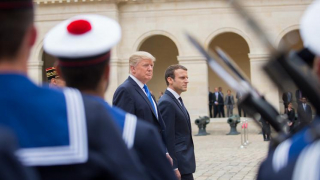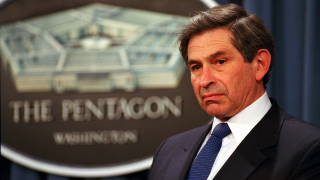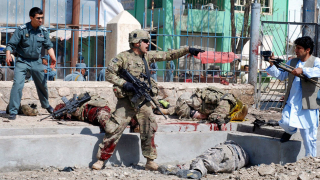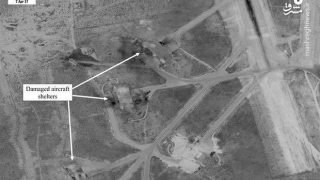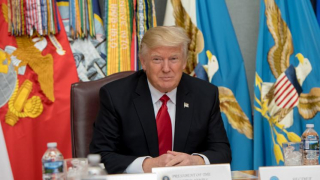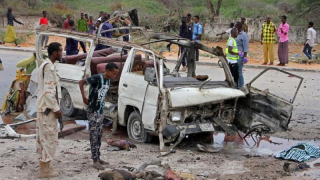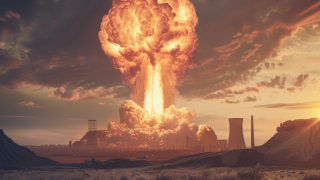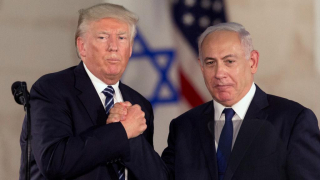Trump signals escalation of war in Somalia
Even with 22,000 western-trained and funded AMISOM troops stationed in Somalia, the country still has not been stabilized. Trump’s directive will only create more death and destruction.
United States President Donald Trump has pledged to intensify the war against the people of Somalia which has gone on for decades.
This latest manifestation of Washington’s intervention in the oil-rich Horn of Africa state came in the form of an executive order granting the U.S. Africa Command (AFRICOM) greater latitude in carrying out military operations inside the country against the al-Shabaab guerrilla movement. However, the Pentagon is attempting to maintain a semblance of caution in their public remarks about military engagement in Somalia.
AFRICOM Commander Marine Corps General Thomas D. Waldhauser said of the situation in Somalia on March 24: “It's very, very important that we have a very, very high degree of certainty in limiting or entirely avoiding civilian casualties. And obviously the cardinal rule in these types of engagements is to not make more enemies than you already have.”
Trump claims that the policy of the previous administration of President Barack Obama hampered the capacity of the Pentagon to defeat al-Shabaab. In reality the Obama White House continued the same routine bombing operations, funding and training of the African Union Mission to Somalia (AMISOM), the maintenance of a Central Intelligence Agency (CIA) field station in Mogadishu and a flotilla of naval warships off the coast of the strategically located country in the Gulf of Aden.
Despite the militarized posture of successive administrations in Washington extending back to President Jimmy Carter in the late 1970s, the nation remains a source of instability throughout the region with a worsening situation for its citizens who are facing growing food insecurity and economic crisis. Even though multi-national oil firms have been drilling for petroleum in the country the people have yet to benefit substantially from their presence.
An article published in the neighboring Kenya’s Daily Nation on April 10 reported: “His March 29 directive removes a requirement that proposed U.S. strikes on Shabaab be vetted at high levels in Washington. The new policy also ends the Obama condition that U.S. attacks can be launched only when the targeted entity is believed to pose a specific threat to Americans. And U.S. raids will no longer be predicated on high probability that civilians will not die as a result.”
There is really no evidence that these were the parameters that guided Pentagon and CIA military and covert action attacks in Somalia. AFRICOM has often denied that its strikes and commando raids deliberately endanger civilians; nevertheless this happens more often than not.
Drone strikes and aerial bombardments have resulted in the deaths and injuries of thousands of Somalis since 2007 when the former administration of President George W. Bush, Jr. sought to undermine the ability of the people to determine their own destiny. Every Somali administration since that period has been under the political dominance of Washington and Wall Street. As a result corruption and inefficiency is widespread while hundreds of thousands of people face joblessness and starvation.
The same Daily Nation report goes on to say that: “the Trump order permits attacks when civilian casualties ‘are deemed necessary and proportionate.’ U.S. officials have acknowledged the heightened danger of civilian deaths — and enhanced recruitment opportunities for Shabaab — as a result of this new authorization.”
A newly-elected administration headed by President Mohamed Abdulahi Mohamed, who holds a U.S. passport, declared a renewed war on al-Shabaab after giving its members 60 days to surrender. Nonetheless, the capacity of the Federal Government to maintain security even in the capital of Mogadishu has proven to be extremely limited.
Wave of attacks
On April 9 it was reported that at least fifteen people were killed in a car bomb attack aimed at assassinating the newly-appointed military leader of the Somali Federal Government. This operation took place right in the heart of the capital of Mogadishu in the aftermath of the inauguration of General Ahmed Mohamed Jimale. A driver attempted to ram a vehicle into the convoy carrying General Jimale. The military official survived the attack yet a minibus carrying commuters was struck causing the bulk of casualties.
In a statement made by the spokesman for the Ministry of Internal Security Abdikamil Moalim Shukri, he noted: “A Shabab suicide bomber targeted a military convoy left from the ministry of defense compound which was carrying the newly appointed Somali military chief. No officials were hurt in the blast. All the victims were civilians.”
Within 24 hours yet another attack took place when a soldier wearing military gear walked into the training academy and detonated a bomb. The academy is located in the western section of Mogadishu.
A survivor of the bombing which killed two colonels said of the attacker: “He entered the camp unstopped. We were sitting under a tree when he came and blew himself up among us.”
Also on April 10 a civil servant died when a bomb in his vehicle was detonated apparently through a remote control device in the Hamarweyne district of the capital.
Insecurity in the Gulf of Aden
Just the day before the attempt to assassinate General Jimale, there was a major effort to seize a commercial cargo ship off the coast of the country by so-called pirates. The ship had 19 Filipino sailors aboard during the attack and was only repelled due to the intervention of a joint Chinese and Indian anti-piracy patrol in the Gulf of Aden.
This incident was only one of five which have been reported over the last several weeks. Pirates recently took control of a Pakistani-owned ship which was transporting food off the coast of central Somalia. Later an Indian-owned vessel was commandeered and redirected to an area for the purpose of seizing its goods.
Somali Minister of Information Abdirahman Omar Osman told the international press in response to the rash of attacks in the Gulf of Aden: “Somali federal government is ready to do its part. But due to our limitation in terms of resources and capacity, we urgently require the support.”
U.S. policy has undermined Somalia
Even with 22,000 western-trained and funded AMISOM troops stationed in Somalia, the country still has not been stabilized. Trump’s directive will only create more death and destruction.
The humanitarian crisis in the country is worsening with people fleeing to neighboring war-torn Yemen which is also under siege by U.S.-backed forces led by Saudi Arabia and the Gulf Cooperation Council (GCC). A boat filled with Somalian refugees was bombed by the GCC U.S.-manufactured warplanes killing many people on March 17 as they attempted to travel along the Red Sea from Yemen to the Republic of Sudan.
An East African regional bloc of nations known as the Inter-Governmental Authority on Development (IGAD) has failed to secure a ceasefire in Somalia. IGAD’s response to the recent bombings has been to threaten further military activity directed against al-Shabaab.
A statement issued by the regional group on April 10 said: “IGAD condemns in the strongest terms possible the Al-Shabab terror attack of Sunday (April 9) that killed innocent citizens and injured others in Mogadishu, the capital of Somalia. This atrocious terror attack which was targeting Somalia’s new military chief is a failure that once again showed Al-Shabaab terror group’s disrespect for human life and civilians’ protection.”
Yet the regional states in East Africa should condemn U.S. policy in Somalia which has resulted in further militarization of the area, destabilizing the society and enhancing the impoverishment of the people.


